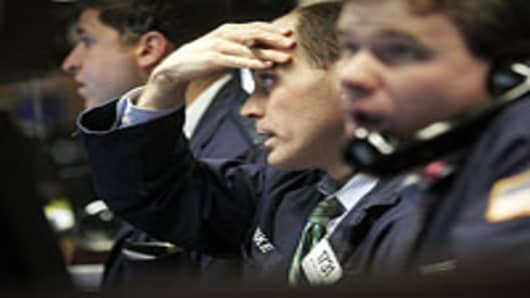This, then, is the dilemma in investing, where normally safety-inclined portfolio managers are now more worried about missing the rallies—the double cheeseburgers—than what happens when the health-food craze takes over—the end of quantitative easing and a return to normalcy in monetary policy.
It’s a trend that has some strategists baffled and worried about the consequences.
“As best as we can tell, the apparent market psychology of the long-onlys is, ‘I can't afford to miss an upmove and trail benchmarks and peers, but if the market goes down and we lose money, so will everyone else, so that's okay,’” Rick Bensignor, chief market strategist at Dahlman Rose in New York, said in his morning note to clients Friday.
“In other words, the most (portfolio manager) pain is felt on his or her underperforming; not so on seeing gains evaporate. This is as close to backwards thinking as we can ever imagine, and it is the result of a marketplace that has fiduciaries paid based upon matching benchmark performance. At least we know what the game is.”
With the market dismissing disastrous news out of Japan and the debt fears in Portgual and elsewhere in the European Union, there seems little option to do anything but buy.
“We’re impressed by how quickly we’ve shaken off what looked like some catastrophic events,” said Ryan Detrick, senior analyst at Schaeffer’s Investment Research in Cincinnati. “Just like that, the bulls are back in charge.”
But there has to be some caution in here somewhere. Right?
Caution, instead, seems a hard ticket to sell when plain-vanilla savings are yielding nothing and stocks and commodities just keep climbing higher.
Money markets continue to hemorrhage cash, with holdings down to $2.732 trillion, according to the Investment Company Institute. That is the lowest number since August 2007—two months before the Dow and S&P 500 hit their historical highs—and it has fallen four weeks in a row.
That trend is a direct result of Fed rate policy that does nothing to encourage saving and everything to push people towards the Wall Street casino, where the Nasdaq yesterday recorded the 11th anniversary of its historic intraday high of 5,078. That peak is about 46 percent higher than where the tech barometer opened Friday.
“If they keep interest rates too low and are artificially low too long, investors will then be forced to take risks that they don’t want to take in order for them to generate returns,” said Tim Courtney, CIO at Burns Advisory Group in Oklahoma City. “This is where I think there should be a little concern.”
But not too much concern, Courtney added, even though he thinks a 15 percent market pullback could be in the offing.
“When you look at the broad asset classes that are out there—stocks, bonds, real estate, commodities—and compare the prices of those asset classes to each other, stocks by far and away come out as the winner,” he said. “That’s the asset class that has the most potential for growth and is currently the cheapest price.”
The cheapness of stocks in an environment of very little economic growth is highly debatable, but it’s a debate for which there is little appetite on cheeseburger-chomping Wall Street.
“I’ll worry about it tomorrow” is the Scarlett O’Hara-esque attitude of investors, Art Cashin, director of floor operations at UBS, told CNBC. “The market seems to shrug (worries) all off. It wants to go higher. It is money looking for someplace to go.”
____________________________________
Questions? Comments? Email us at NetNet@cnbc.com
Follow Jeff @ twitter.com/JeffCoxCNBCcom
Follow NetNet on Twitter @ twitter.com/CNBCnetnet
Facebook us @ www.facebook.com/NetNetCNBC



